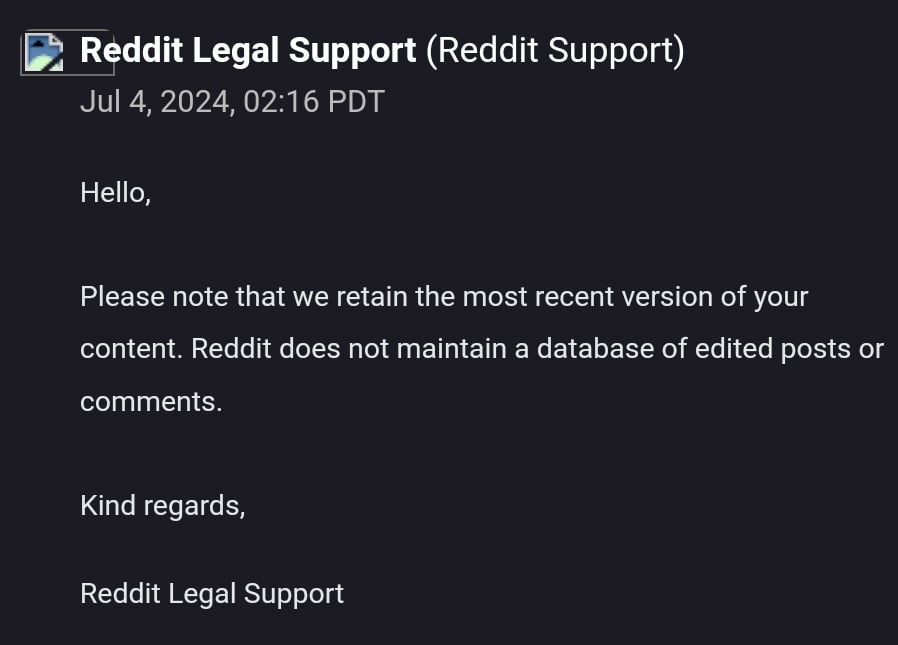

Oh [email protected] does have moderation. The mods there are very deliberate in the things they do(n’t) allow. Woe betide you if you ever criticize certain historic (or current) authoritarian genocidal regimes.


Oh [email protected] does have moderation. The mods there are very deliberate in the things they do(n’t) allow. Woe betide you if you ever criticize certain historic (or current) authoritarian genocidal regimes.


Expectations of what is part of the discussion, not expectations of privacy.
As for doxxing, that’s a problem with all social media - but possibly worse on the “regular” ones (people having mobs attacking their houses, being arrested in countries with censorship laws etc.)


Admins and moderators can already take care of these sorts of problems.


That’s because it’s supposed to be. I was on Reddit for a decade until their management shit the bed, and these kinds of problems weren’t a thing there despite the much larger userbase.
For the record, to me it’s less about privacy and more about setting expectations. I’m not anonymous online, I’m pseudonymous, I’ve had this handle for a long time. I am my online identity, and when I post and vote I don’t feel anonymous, even if I’m relatively protected from someone knocking on my door or messaging my boss about a statement.
If voting “ledgers” aren’t presented in the discussion, that’s because they aren’t intended to be part of the discussion. This reduces the value of influential individuals votes (ooh Bill Gates liked X, Kamala Harris disliked Y etc.) and shifts focus to how the community values of the content. It’s the same reason that we follow communities rather than individuals. We get an internet “hive mind” of sorts without cult of personality.


Votes already are presented to the end user in an aggregated fashion, as opposed to how it is on kbin/mbin. In any case, even in the current implementation manipulation is relatively easy, as an admin can just spin up extra accounts. The fediverse relies on trust.


I like the idea - if the lemmy devs do implement public voting I’d definitely move over. Not only does it maintain the (current) state of voter visibility, but it also protects from the frequently cited admin and kbin/mbin exploits. Trusting one admin is far easier than trusting every admin.
I was actually having similar thoughts after reading the post (forking lemmy) but idk if I have the time to run an instance.


We’ve already seen that kind of harrasment on major platforms including X and those owned by Meta.


This kind of sentiment is exactly why votes need to not be visible. As soon as the general expectation is that votes are public information free to be used and abused, it will be used and abused.


If we look at any of the big social media platforms with public votes, that has not prevented voting abuse through bots and the like. Rather it has served to fuel online harrassment campaigns and value of influential individuals votes (ooh Bill Gates liked X, Kamala Harris disliked Y etc.)
Aggregating votes rather than having individually visible votes serves the purpose of shifting focus to how the community values of the content. It’s the same reason that we follow communities rather than people.


What’s better is to edit every comment and keep your acc active so they can’t roll it back.
I asked through support whether they keep previous versions of edited comments and posts, which they claimed that they don’t.



Idk, it’s FOSS, so you could always try, but just complaining and hoping somebody picks up on it probably also works. I don’t judge :)


You can still make a bug report, so that somebody with the actual means can look into it. If every action is duplicated that’d be pretty severe, if not, well it’ll be closed.


On a basic level, the idea of certain sandboxing, i.e image and link posting restrictions along with rate limits for new accounts and new instances is probably a good idea.
However, I do not think “super users” are a particularly good idea. I see it as preferrable that instances and communities handle their own moderation with the help of user reports - and some simple degree of automation.
An engaged user can already contribute to their community by joining the moderation team, and the mod view has made it significantly easier to have an overview of many smaller communities.
I agree that it would be better if people used votes as a marker of quality, but strongly disagree on moderation action based on voting.
Personally, there’s three scenarios when I use downvotes w/o commenting:
Someone has already voiced the reason
I don’t have time/energy to comment
The target is a censored echo-chamber that will ban anyone who disagrees (can’t vote/show disapproval if you’re banned) - example would be .ml communities having moments about how stalinist USSR did nothing wrong.
Anyway, once a post from a community rises sufficiently to pop up on all, it becomes a part of the larger discussion, and voting will shift towards the opinions of the larger fediverse. This is also usually when communities get discovered by more people. If a community doesn’t want the engagement of the wider user-base, a closed blog may be more suitable as a forum, or alternatively have an instance w/o downvoting.
When browsing all or new I do so both to break out of my bubble and to vote on content (usually stuff I find interesting).